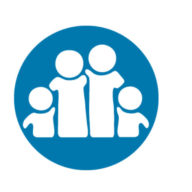Eating Disorders

What is the Difference Between Disordered Eating and Eating Disorders?
First of all, normalized, non-disordered eating is when one mindfully consumes food when hungry and is able to stop when satiated. Additionally, variety is incorporated into the diet. Disordered eating and eating disorders (EDs) share some commonalities, but it is important to recognize that they are not the same. While people with disordered eating habits may be preoccupied by thoughts around food and their body, their life generally isn’t greatly impacted.
However, the level of obsession around ED thoughts and behaviors is a distinguishing factor. Their thoughts are all-consuming; they center around calories, taste, food avoidance, where to buy food, etc. This level of preoccupation can impair focus, the ability to stay present, and sleep, among other things. For example, an individual might not attend work or school on occasion due to the compulsion to exercise. Or a person might not socialize with friends because of the fears around judgment while they eat. Oftentimes, those struggling report that their ED began as disordered eating. This by no means indicates that all who engage in disordered eating will have an ED.
The Most Common Types of EDs:
- Anorexia Nervosa: Involves food restriction, an intense fear of gaining weight, and sometimes extreme exercising.
- Bulimia Nervosa: Involves repeatedly binging on large amounts of food and then purging it by forcing oneself to throw up, over-exercise, and/or using diet pills and laxatives. There may or may not be weight loss or gain.
- Binge Eating Disorder: Episodes of binging on large amounts of food within a short period of time. Guilt and shame follow, however, no purging. Typically much weight is gained.
- Avoidant Restrictive Food Intake Disorder: This is characterized by severe restriction and avoidance of certain foods or entire food groups. Often seen in children, some may only eat a minimal variety of food due to fear of choking, texture issues, unknown ingredients, too many ingredients, etc. This can lead to malnutrition and impaired growth.
- Orthorexia Nervosa: An Obsession with eating 100% ‘healthy’ that disrupts one’s life.
The Psychology and Physiology of Eating Disorders
EDs are complex mental and physical illnesses characterized by disturbances of a person’s eating habits, thoughts, and feelings concerning food, body image, and weight. This can affect a person of any gender, age, or cultural background, usually first appearing during adolescence or young adulthood.
Food guilt comes from mistaken beliefs about oneself, one’s body, and food, as well as breaking “food rules”, such as, “I am not allowed to eat anything with sugar in it or else I need to find a way to purge” (labeling food as either good or bad).
When this guilt so painfully intensifies, it evolves into shame, and the feelings of being flawed and unworthy of love and compassion become overwhelming. It is extremely difficult to get out of the cycle of guilt and shame as one’s negatively critical internal voice gains power and control. This can lead to anxiety, depression, obsessive-compulsive disorder, or other mental health struggles.
Wrestling daily with an ED distracts from facing one’s feelings which can seem confusing, overwhelming, and uncontrollable. After achieving a sustainable weight, treatment will focus on facing and coping with these emotions.
Physically, EDs wreak havoc on one’s body. When faced with malnutrition, the heartbeat slows to conserve energy. This results in too little oxygen reaching organs, leading to fainting, dizziness, fatigue, chest pain, confusion, and exhaustion. In addition, the heart actually shrinks, so less blood is pumped throughout the body even though the heart is overworking. Malnutrition can also cause abnormal heartbeats which can become fatal.
Why Me? Hypothetical Causes of EDs
The exact causes are unknown, but several factors can contribute to the development of an ED.
- Biological Factors: Genetic predisposition, puberty, or hormonal imbalance.
- Psychological factors: Low self-esteem, perfectionism, depression, or anxiety.
- Social and Cultural Influences: Society and social media promote unrealistic body standards and reward thinness.
- Trauma: Emotional, physical, or sexual abuse, being bullied, experiencing death, divorce, job loss can trigger EDs.
- Family and Peers: Disordered eating may be modeled by those in your social circle along with using judgments around eating.
- Medical Conditions: A chronic illness such as Crohn’s Disease or diabetes can lead to an unhealthy relationship with food.
Treatment Options
You can recover from an ED. The truth is that, once recovered, one must continue to be mindful of triggers and recognizing behaviors of relapse. ED treatment supports individuals in learning the skills and compassion needed to respond to life’s stressors in a healthy way. Often an ED can feel so important that a life without it is unimaginable, however, freedom from the control of EDs can be obtained. A wise first step is to first take the person to a physician or a mental health professional.
Evidence Based Interventions:
- Dialectical Behavior Therapy
- Radically Open Dialectical Behavior Therapy
- Cognitive Behavioral Therapy
- Exposure and Response Prevention
- Emotion Focused Family Therapy (An ED impacts the entire family)
- Motivational Interviewing
- Experiential Therapies (Art, Drama, Movement)
- Working with a nutritionist
Final Words and Resources
Just as anyone can develop an eating disorder, so too, anyone can get better. However, overcoming an ED is about more than giving up unhealthy eating behaviors. It is also about learning new ways to cope with emotional pain and rediscovering one’s identity beyond eating habits, weight, and body image.
Self-Help Books:
“Living Without ED”, Jennifer Schafer
“Sick Enough”, Jennifer Gaudiani
Online Magazine:
edcatalogue.com (or google Gurze Salucore)
Best ED Apps:
Recovery Record (RR) #1 pick Free
Rise Up + Recover Free
Hotlines for ED:
NEDA Helpline: 800-931-2237
ANAD Helpline: 630-577-1330
NAMI Helpline: 800-950-6264
Additional Resources:
NEDA (National ED Association): nationaleatingdisorders.org
Eatingrecoverycenter.com
Anad.org (The national association for anorexia and associated disorders)

